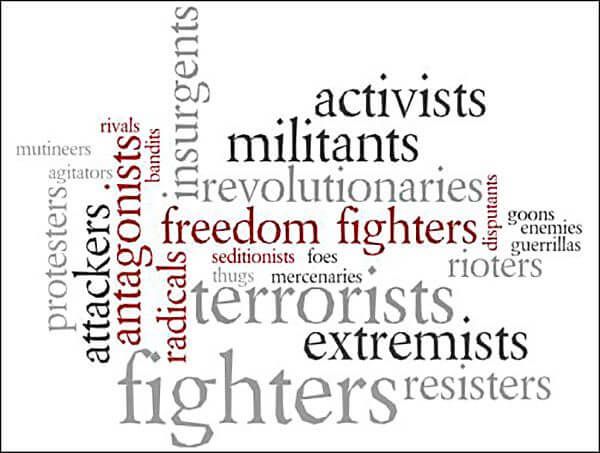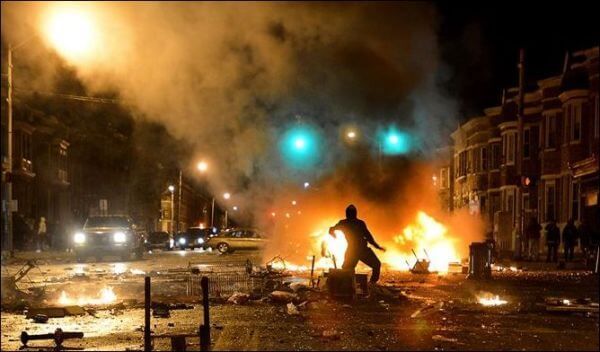Part one of an eight-part series explaining The 8 Categories of Media Bias.
Violation #1
Misleading Definitions and Terminology
Prejudicing readers through language.
Language is too often used to promote an agenda. The media must exercise caution when consciously choosing to adopt (or avoid) certain terms, proper nouns, or foreign words. George Orwell articulated the potential problems:
But if thought corrupts language, language can also corrupt thought.
Watch the Jerusalem Post’s Steve Linde and Gil Hoffman, the Algemeiner’s Ruthie Blum, and Dan Diker of the Jerusalem Center for Public Affairs discuss misleading terminology with HonestReporting.
Since this was first published, new examples have been added.
EXAMPLE: After the attacks of 9/11, Stephen Jukes, then Reuters’ global news editor, sent a memo instructing the wire service staff not to use the word terror. His explanation became a catch-phrase for the news industry’s moral ambiguity:
We all know that one man’s terrorist is another man’s freedom fighter, and that Reuters upholds the principle that we do not use the word terrorist.
Dissatisfied with Reuters’s policy of not using terror, the Canadian news chain, CanWest, began inserting the word into wire copy. Reuters executives objected, claiming that its usage would confuse readers and endanger reporters. CanWest executive Scott Anderson responded (emphasis added):
If you’re couching language to protect people, are you telling the truth?
And after the 2015 terror attacks on the office of Charlie Hebdo and a Paris kosher market, Tarik Kafala, the head of BBC Arabic, explained his reticence with the T-word:
“We try to avoid describing anyone as a terrorist or an act as being terrorist. What we try to do is to say that ‘two men killed 12 people in an attack on the office of a satirical magazine’. That’s enough, we know what that means and what it is.”
Value-neutral words like militant, extremist, or activist, downplay or even mitigate, deliberate acts of violence intended to cause fear and achieve a political goal.

EXAMPLE: The Palestinian Authority filed a formal complaint with Portugal’s Syndicate of Journalists over a December, 2015 report filed by Israeli-Portuguese reporter Henrique Cymerman over his use of language. The PA specifically complained that the bias of the dispatch, broadcast on Portugal’s Independent Communication Company (SIC), was in an on-screen caption which used the word murder to describe Israelis killed in Palestinian stabbing and car-ramming attacks while saying the Palestinian assailants were merely killed.
According to the PA, the caption wording “equates the occupier and the occupied and goes further to justify the cold-blooded murder by the Israeli occupation forces of Palestinian youths and children.” The Syndicate rejected the complaint, essentially affirming that it is inaccurate to say slain Palestinian attackers were murdered. The full ruling‘s online at the Syndicate’s web site.

EXAMPLE: For some 3,000 years, Jerusalem was a unified city that made no distinctions between “East” and “West.” The concept of East and West only came about in 1948, at the end of Israel’s War of Independence, when the armistice left Israel in control of Jerusalem’s western neighborhoods and Jordan in control of Jerusalem’s eastern neighborhoods.
Jordan expelled all the Jews living in the areas under its control, making 1948-1967 the only period of time when eastern Jerusalem could plausibly be labeled Arab. Jerusalem was reunited in 1967, and Jews and Arabs are free to live anywhere in the city as before.
However, we’ve seen descriptions of the eastern areas of the city as traditionally Arab east Jerusalem (Associated Press) and Arab East Jerusalem (Daily Telegraph, BBC, and Los Angeles Times, for example). And yet Arab East Jerusalem is not a proper noun anymore than, for example, referring to Harlem as “Black North Manhattan.”
EXAMPLE: A 2015 BBC documentary, Children of the Gaza War, in which translators deliberately mistranslated the word Yahud (which is Arabic for Jew) as Israeli. In one particular instance, a Gaza child told reporter Lyse Doucet, the “yahud” are massacring Palestinians, while the subtitle read, “Israel is massacring us.”
The Arabic word for Israeli is Yisraili.
Other Examples
Are asylum seekers crossing the Mediterranean to Europe migrants or refugees? Should members of Islamic State be labeled Islamic extremists or violent extremists?
In an article about the Democratic Party platform’s views on the Israeli-Palestinian conflict, the New York Times created a fuss by putting the word “occupation” in quote marks, then quietly removed them.
Following the Baltimore riots of April, 2015, editors wrangled over the use of looters vs. protesters. After a white supremacist killed nine African-Americans in a Charleston church in June, 2015, journalists grappled with the question, do you capitalize the words black and white? Similarly, should the men involved in a 2016 Oregon standoff be called militiamen or armed ranchers?

What’s a news agency to do when vulgar language becomes part of the story, such as during the 2016 US presidential campaign or after White House communications director Anthony Scarmucci’s meltdown interview with the New Yorker? When it comes to publishing sexual words, insults, epithets and other inappropriate language, What are the guidelines?
A south Florida TV station, WPBT2, suspended Kalyn Chapman James for calling Dallas sniper Micah Johnson a martyr for killing five cops.
Colorado media grappling with how to describe a “death with dignity” referendum initiative. Is the issue more aptly called assisted suicide or medical aid-in-dying?
What’s the difference between lies, falsehoods, exaggeration and deflection, and how should reporter know which words to use when critically examining President Donald Trump’s rhetoric and tweets?
Trump told two demonstrable falsehoods this AM, one about his administration’s policy of separating undocumented immigrant kids inclu infants from their parents, which he tried to claim wasn’t his own policy. The other was falsely claiming his own aide didn’t give a bg briefing.
— Maggie Haberman (@maggieNYT) May 26, 2018
Following the violence in Charlottesville, Virginia during a white supremacist rally, AP executive John Daniszewski instructed reporters “that the term ‘alt-right’ should be avoided because it is meant as a euphemism to disguise racist aims” and clarified usage of other terms such as white nationalist, white supremacist, as well as alt-left and antifa (which is shorthand for anti-fascist).
Last but not least, the Columbia Journalism Review raised this question: At what point does jargon become common usage that editors can assume everyone understands?
Click to learn more about each individual category.
The 8 Violations of Media Objectivity
- Misleading definitions: Prejudicing readers through language.
- Imbalanced reporting: Distorting news through disproportionate coverage.
- Opinions disguised as news: Inappropriately injecting opinion or interpretation into coverage.
- Lack of context: Withholding a frame of reference for readers.
- Selective omission: Reporting certain events over others, or withholding key details.
- Using true facts to draw false conclusions: Infecting news with flawed logic.
- Distortion of facts: Getting the facts wrong.
- Lack of transparency: Failing to be open and accountable to readers.
See also the introduction to this series and some final thoughts and acknowledgements, wrapping the concepts together and raising awareness for news literacy.
“Red Lines: The Eight Categories of Media Bias,” is available on Amazon for purchase as an e-book.
Baltimore via US Department of Defense;
Before you comment on this article, please remind yourself of our Comments Policy. Any comments deemed to be in breach of the policy will be removed at the editor’s discretion.

